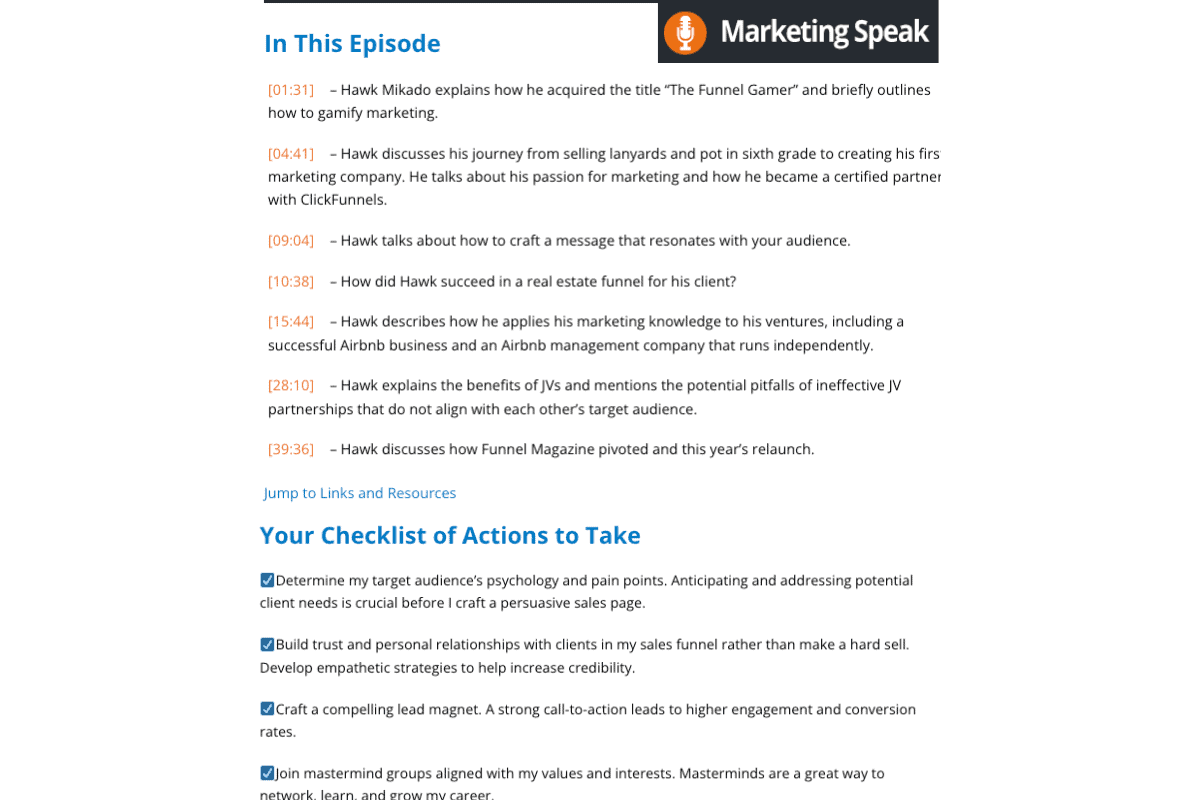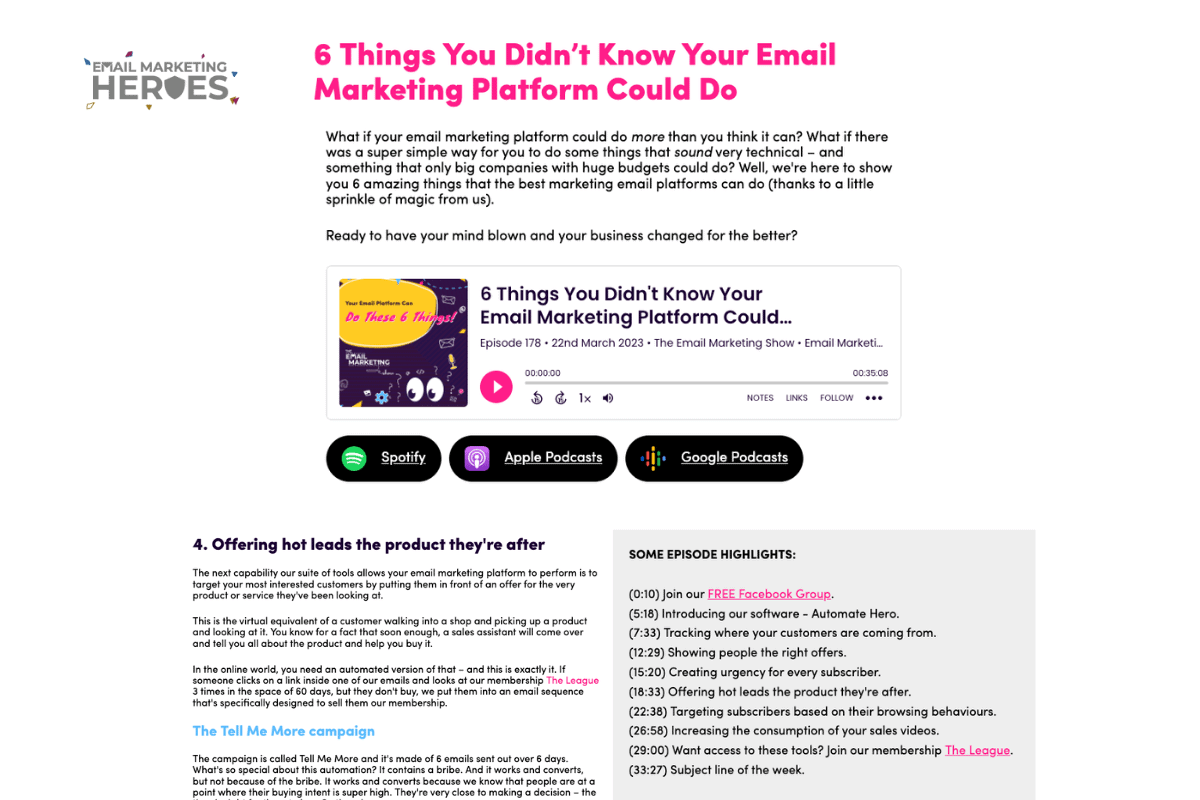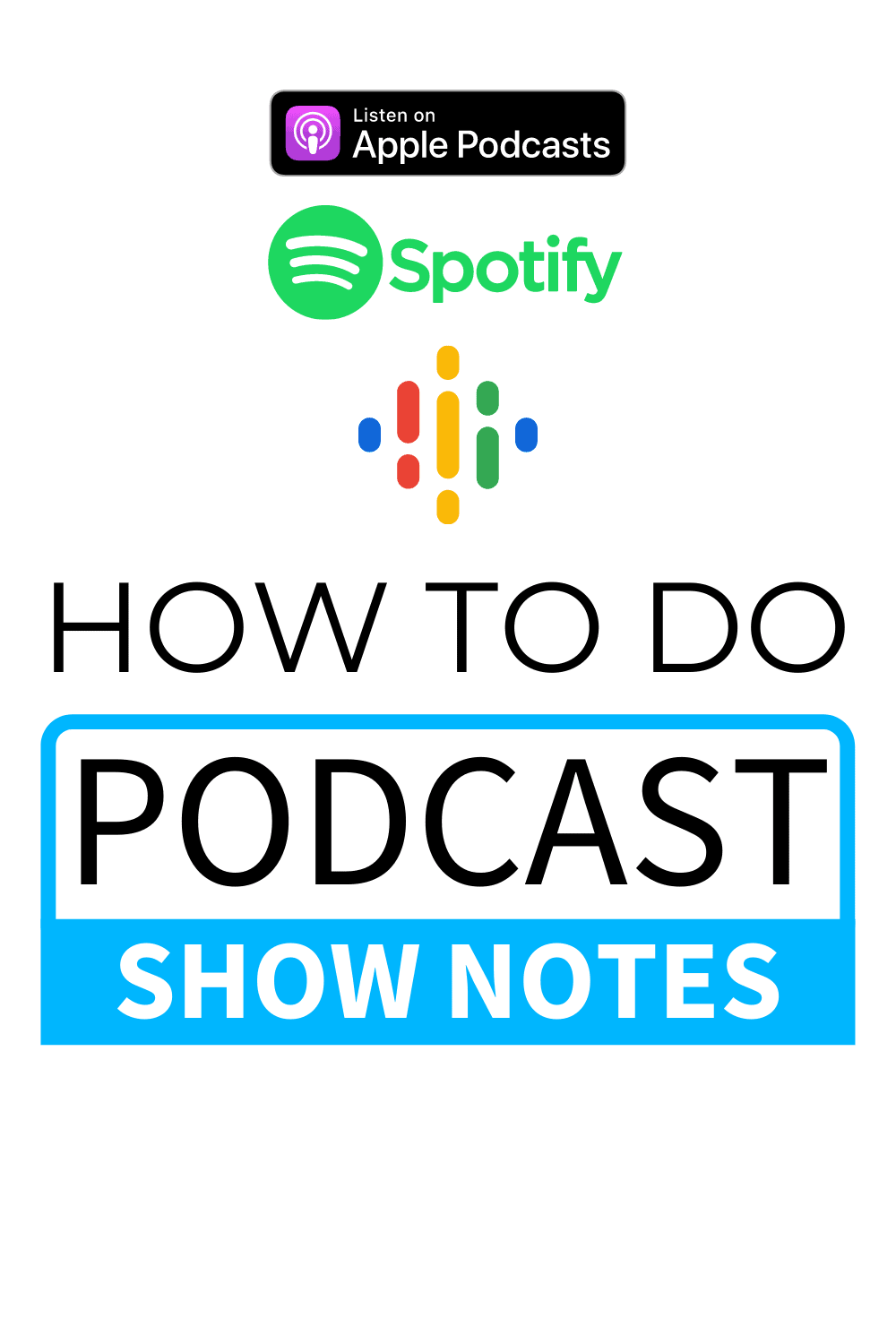Podcasts are a wonderful marketing channel for entrepreneurs once they've got an audience. But getting new podcast listeners is notoriously difficult. Did you know you can leverage Search Engine Optimization (SEO) to boost your podcast listenership? Want to get free traffic to your website? Want to exponentially grow your podcast every month?
Here's how to write the perfect podcast show notes and smash your goals.
The sad truth is that most podcast show notes get little attention, even if the episodes are high quality and offer lots of value. Many great podcasts are almost invisible on the podcast networks and rely on luck to get noticed. Apple's podcast ecosystem is terrible for finding new content. It just happens to be the biggest platform for distribution so that's bad for everyone except the big players.
Apple's recommendation engine merely recommends the trending podcasts and always seems to offer up the same few shows. Even when I search, I get old episodes from podcasts that haven't published anything in ten years.
Want to exponentially grow your podcast every month? Write amazing podcast show notes and smash your goals.
People are starting to use Google to search for podcast shows. Google has its own podcast network (Google Podcasts) and podcast app, so of course the big G will be doing its best to promote its own products over everyone else's. But Apple and Spotify are still far ahead. And the lead is increasing.
But the fact that Apple isn't the only player in town has led more people to consider other places for podcast discovery. It's common for your potential listener to type the name of a show or a topic + podcast into Google. If you don't appear, you may never get discovered by your target podcast listener.
This is where you can take advantage of SEO for your show and episodes. Few shows are leveraging SEO for marketing their show so it's a great opportunity to stand out.
I worked with a podcaster who had released hundreds of episodes but he rarely got over 200 listeners per episode. While that's nothing to sneeze at, it's still low for a podcast show that has been around for several years and consistently produces good content. My suggestion to create show notes and SEO-focused blog posts for each episode was received the same way most people receive news that they might have to do work to get ahead. He ignored my advice.
Yet, other podcasts producers are doing really well with this tactic and there's no reason to believe that it won't continue to deliver results.
SEO for podcast episodes
Use blog and podcast SEO to get your podcast noticed. Most podcasters are doing a terrible job or not even bothering with this. But that's a mistake. Google is now indexing podcasts and you can use the podcast content to rank organically. Take advantage of the SEO benefit of written content.
Create detailed show notes from the podcast. Many hosts are tempted to just post a transcript of the show, but that's a mistake. Transcripts can make for terrible reading. If you don't believe me, try recording a conversation and reading back the transcript. We don't communicate via written text the same way as we do when we're talking. The key to good show notes transcriptions is to edit the podcast and optimize the transcript.
Transcripts can often be full of grammatical errors, spelling mistakes, and weird sentence structures. They are boring to read and there's no flow. This is not what the search engines consider high-quality content, so why publish it?
Direct transcripts are not great for podcast SEO, so I recommend you don't add them to your show notes page. I've been researching other podcasters and the ones that rank on Google create detailed show notes that are formatted for readers.
Transcripts are a terrible reading experience. Although they are better than nothing, it pays to take the time to properly format your podcast notes into a genuinely useful blog post.
- Create an intro based on your own research or an edited transcript of the interviewee's self-introduction. Tell the reader what they will learn by reading the text and by listening to the show. Explain why people should read on and listen in.
- Make the podcast titles and episode descriptions enticing so that they will attract clicks.
- Use bullet-point lists whenever possible. If a podcast guest gives great tips and advice, format the episode's main talking points into a list and highlight them. These sound bytes can be repurposed in social media channels like Twitter, Facebook, and Instagram. Shorter, snappier clips and audio content helps engage people with shorter attention spans (which seems to be most people these days).
- Break up the text into short bite-sized paragraphs.
- Use quotes only where necessary. Describe the conversation without actually using direct speech transcriptions.
- Finish with a brief summary and add links to important content, further reading, and related podcasts. Add affiliate links to boost revenue.
Podcast transcription software
One of the best transcription software for podcast recordings, and one I've used extensively, is Descript, a full-suite podcast editing software. Descript is one of the fastest-growing tools for audio and video editing thanks to the revolutionary tech that lets you edit videos like a Word document. The audio transcription, video transcription, and on-the-fly editing capabilities are incredibly good.
Another excellent option is Podcastle, a new AI-powered service that gives you recording, editing, transcription, and distribution in one convenient online hub with studio-grade tech and cutting-edge AI technology.
One of the hottest podcast recording tools at the moment is Riverside. Everyone from Tim Ferriss to Gary Vee is using it. Riverside allows you to record video at the same time as your audio and there's no degradation in video or audio quality. On top of that, the transcribe tool delivers perfect transcriptions of conversations every time.
Keyword-focused Episode Titles
Try to come up with a topic or keyword focus for a particular episode's title. If you're interviewing Gary Vaynerchuk about his wine channel venture from back in the day, you might want to call the episode “How Gary Vee grew his wine channel from zero to 1 million subscribers” or something along those lines.
Do keyword research to find topics that people want to hear about. If they're not looking for information on Gary's wine business, then give the post a different title (as long as the subject matter still matches the title).
If your guest is not well known, you could write about their skills or industry. If you're interviewing a digital nomad, you could mention all of the tips they offer in the show. Title the podcast show notes “Digital Nomad tips for 2021” or something like that.
The possibilities are endless but the more “findable” and relevant you make your content, the easier it will be for new people to find your stuff.
Create a post for every podcast on your site and add detailed show notes with headings. Bullet points are good, and quotes are great. Add images and of course, the embedded show audio. Give each episode a keyworded title.
If you're struggling to write good podcast titles, try one of these Artificial Intelligence writing software that can help you craft a great podcast show title in seconds.
Repurpose Audio
Create short clips or an entire show with lots of graphics, animations, and videos on YouTube. I don't recommend adding podcast episodes as audio to YouTube. Create a video for your podcast or some kind of visual element. You can then embed these short videos into the blog post. In this way, you get the added benefit of interlinks between the two biggest search engines in the world (Google and YouTube).
When people watch on YouTube they can then find your blog and vice versa. But the end goal is brand awareness for your podcast show.
You can also share audiograms, a style of clip that combines text and video, on social media for better reach.
Try this podcast audio repurposing service if you don't fancy doing the work yourself.
Structured Data
Use structured data (schema markup) to help Google understand what the pages are about. Adding schema markup tells search engines what type of page you have and this can help your pages index better.
If you're using WordPress, two plugins can help add structured data to your show notes pages: SEOPress and WP Schema Pro.
Podcast SEO is one of the best ways to get exposure and a new audience to your show.
Listen Notes and Other Podcast Directories
Make sure to submit your show to Listen Notes. Listen Notes is a database of podcast shows and is a great way to find and follow new podcasts. I love this website and it's getting really popular. And it beats the search abilities of Apple, Google, Sticher, and Spotify. Attract new listeners by creating a compelling espisode description and graphic.
Finish with a Call To Action
You're wasting an opportunity if you're not asking your readers to do something. You've got their attention, so why not ask them to subscribe to the podcast, read more podcast notes, join your email list, or even listen to the episode? A call to action somewhere in your podcast show notes can also help keep people engaged and generate more pageviews on your website (great for SEO).
Resource links can also act as indirect calls to action. Not only do resource links add value but the additional resources mentioned could potentially improve the SEO of each page of show notes. And there's no reason why you can't include affiliate links.
Podcast show notes examples
Marketing Speak
One of the best examples of great show notes is Stephan Spencer's Marketing Speak. His show notes are extremely well organized, detailed, and include links to almost everything he mentions. It's easy to browse the episode at your own pace, find detailed information on topics that interest you, and get more information if you need it. This is exactly what good podcast show notes should do.

Email Marketing Heroes
Email Marketing Heroes‘ podcast show notes pages have a clear structure and are well organized.
Episodes are presented well with headings and bullet points to make it more skimmable. Podcast episode show notes pages start with an engaging introduction, followed by links to various podcast platforms for easy access. You can skim the timestamps for different sections of the podcast and jump to wherever interests you. The page formatting is typical, but very user-friendly, with bold headings, bullet points, and numbered lists to break up the text and make it more digestible.
When it's relevant, there are detailed descriptions of tools or tactics in email marketing discussed in the corresponding podcast episode.
And there's a small section that might draw readers to the notes week after week. It's called “Subject line of the week” and it adds an extra element of engagement for readers and listeners.

Podcast Show Notes Service
If you've read this far, you'll know that the art of writing podcast show notes is not just a case of transcribing show audio. There's quite a bit of nuance and plenty of creativity required. Try the highly-rated podcast episode summary service from Verblio.
Get the highlights from your podcast episodes quickly. Get shareable assets for your website, podcast delivery network, and social media. Share the content with guests.
Then add your unique touch and improve the process in conjunction with the service.
Frequently Asked Questions
What Are Some Benefits Of Writing Show Notes?
The benefits of podcast show notes include better user experience thanks to highlighted important show topics and points and increased visibility in search engines which results in more traffic.
What to include in your podcast show notes?
Start with a catchy, copywriter-level SEO title, an episode summary of important topics, links to relevant websites, resources mentioned, and other podcasts, a podcast transcript that includes memorable quotes, guest bio, episode number, timestamps, audio content clips, and the full episode player, and bullet points on the most important show takeaways.
Where should I put my podcast show notes?
Ideally, you will host your own website but you can also publish show notes on podcast hosting platforms like the AI-powered Podcastle, which also does transcriptions. Hosting podcasts “show notes” on individual pages on a website that you own and manage is another option. Embed your podcast episode in WordPress along with the episode summary and supporting content.
Do I need graphics for my podcast episodes?
It will certainly help to have great artwork for every podcast episode. A featured image will help when people share it on social media. Pinterest pins can help get attention on the visual search platform. Graphics and images in the content will also help break up the text and offer search engines more context. Pixlr, Visme, and Adobe Express are great tools for producing graphics. Or if you produce a lot of episodes and want something more hands-off, try DotYeti or Penji for unlimited graphic design.
Where can I buy songs for podcasts?
Artlist and Soundstripe offer unlimited use royalty-free songs by Grammy-winning artists. You won't have to worry about DMCA strikes or copyright issues on Podcasts or YouTube.

